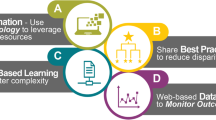Abstract
The present paper is a longitudinal study which aims to develop and deliver cancer nursing education conferences in Honduras using volunteer nurse educators. This program intends to (1) perform site assessments of work environments and resources for cancer care in Honduras, (2) develop cancer nursing education programs, (3) survey conference participants continuing education needs, (4) deliver cancer nursing education conferences, and (5) share data with local and global partners for future cancer programs. The study draws on a longitudinal program development with site assessments, data collection, and educational conferences at two time points. Assessments and surveys were used for conference development and delivery by volunteer nurse educators. Site assessments and conferences were delivered twice. Data were collected regarding assessments and surveys to inform program development. Survey data revealed that <4 % had formal training in cancer care and >65 % had internet access. Participants desired more information about handling of chemotherapy, symptom management, and palliative care. Volunteer nurse educators perform site assessments and develop educational programming for cancer nurses. Local and global partners should explore internet-based programs between site visits to create sustainable education programs.
Similar content being viewed by others
References
GLOBOCAN (2008) Fast Stats: Honduras. Available from http://globocan.iarc.fr/factsheets/populations/factsheet.asp?uno=340
GLOBOCAN (2008) Fast Stats: Less Developed Regions: Both Sexes. Available from http://globocan.iarc.fr/factsheet.asp#BOTH
Green SS, Comer L, Elliott L, Neubrander J (2011) Exploring the value of an international service-learning experience in Honduras. Nurs Educ Perspect 32(5):302–307
Harford JB, Otero IV, Anderson BO et al (2011) Problem solving for breast health care delivery in low and middle resource countries (LMCs): consensus from the Breast Health Global Initiative. Breast 20:S20–S29
Heck JE, Bazemore A, Diller P (2007) The shoulder-to-shoulder model-channeling medical volunteerism toward sustainable health change. Fam Med 39(9):644–650
Hongoro C, McPake B (2004) How to bridge the gap in human resources for health. Lancet 364:1451–1456
International Council of Nurses. ICN Strategic Plan 2011–2014. Available from http://www.icn.ch/images/stories/documents/about/ICN_Strategic_Plan.pdf
Kellie SJ, Howard SC (2008) Global child health priorities: what role for paediatric oncologists. Eur J Cancer 44(16):2388–2396
Lasater K, Upvall M, Nielsen A, Prak M, Ptachcinski R (2011) Global partnerships for professional development: a Cambodian exemplar. J Prof Nurs 28(1):62–68
Leffers J, Mitchell E (2010) Conceptual model for partnership and sustainability in global health. Publ Health Nurs 28(1):91–101
McKinnon T, Fealy G (2011) Core principles for developing global service-learning programs in nursing. Nurs Educ Perspect 32(2):95–100
Miller K, Cramer A (1999) Professional growth through volunteerism. Am J Nurs 99(1 Pt 1):48
National League for Nursing. Faculty Preparation for Global Experiences Toolkit©. Available from http://www.nln.org/facultyprograms/facultyresources/toolkit_facprepglobexp.pdf
Oken E, Martinez Stoffel E, Stern LJ (2004) Use of volunteer medical brigades to assess growth in Honduras. J Trop Pediatr 50(4):203–208
Ott J, Ullrich A, Masacarenhas M, Stevens GA (2010) Global cancer incidence and mortality caused by behavior and infection. J Publ Health 33(2):223–233
Parsi K, List J (2008) Preparing medical students for the world: service learning and global health justice. Medscape J Med 10(11):268
Redwood-Campbell L, Pakes B, Rouleau k, MacDonald CJ, Arya N, et al (2011) Developing a curriculum framework for global health in family medicine: emerging principles, competencies, and education principles. BMC Medical EDucation, 11, 46. doi:10.1186/1472-6920-11-46
Rennert W, Koop E (2009) Primary health care for remote village communities in Honduras: a model for training and support of community health workers. Fam Med 41(9):646–651
Reisch RA (2011) International service learning programs: ethical issues and recommendations. Dev World Bioeth 11(2):93–98
Riberio RC (2012) Improving survival of children with cancer worldwide: the St Jude International Outreach Program Approach. Advancing Cancer Education and Healthy Living in Our Communities. doi:10.3233/978-1-61499-088-8-9
Syed SB, Dadwalm V, Rutterm P, et al (2012) Developed–developing country partnerships: benefits to developed countries? Globalization and Health, 8,17. Doi:10:10.1186/1744-8603-8-17
Thun MJ, Delancey JO, Center MM, Jemal A, Ward EM (2010) The global burden of cancer: priorities for prevention. Carcinogenesis 31(1):100–110. doi:10.1093/carcin/bgp26
UN General Assembly 11138 (2011). Press release. Available from http://www.un.org/News/Press/docs//2011/ga11138.doc.htm
Williams JA, Donahue N, Chammas G, Fouladi M, Bowers LJ, Ribiero RC (2003) Training subspecialty nurses in developing countries: methods, outcome and cost. Med Pediatr Oncol 41:136–140
World Bank Estimates (2004). Available from http://data.worldbank.org/country/honduras
Acknowledgments
Travel support from the American Society of Clinical Oncology's International Cancer Corps, Health Volunteers Overseas and the Benjamin Josephson Fund. Book donations: Oncology Nursing Society (ONS), the Mansfield Ohio Chapter of the ONS, and Jones and Bartlett Publishers. We wish to thank Dr. Hoover Rodriguez for his assistance in creating and delivering the programs. The authors wish to thank Dr. Lesly Castro Harris and Francisca Morales for translation of the slides for the conferences.
Author information
Authors and Affiliations
Corresponding author
Additional information
Clinical Resources
American Society of Clinical Oncology International Cancer Corps: Olunteer + Abroad/ASCO + International + Cancer + Corps, Health Volunteers Overseas. http://www.hvousa.org/, and National League for Nursing. Faculty Preparation for Global Experiences Toolkit©. http://www.nln.org/facultyprograms/facultyresources/toolkit_facprep globexp.pdf.
Electronic Supplementary Material
Below is the link to the electronic supplementary material.
ESM 1
(DOCX 65 kb)
Rights and permissions
About this article
Cite this article
Sheldon, L.K., Wise, B., Carlson, J.R. et al. Developing a Longitudinal Cancer Nursing Education Program in Honduras. J Canc Educ 28, 669–675 (2013). https://doi.org/10.1007/s13187-013-0497-6
Published:
Issue Date:
DOI: https://doi.org/10.1007/s13187-013-0497-6




